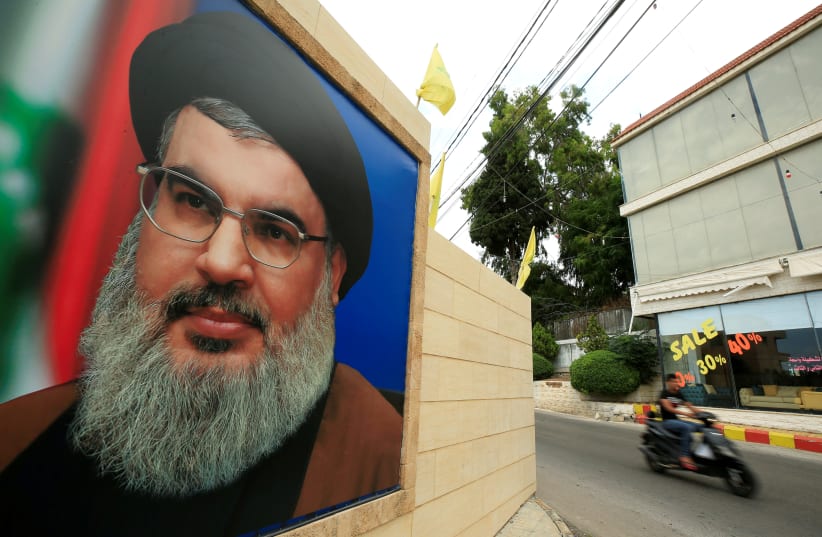Hezbollah Secretary General Hassan Nasrallah claimed that the terrorist group's munitions are not kept in civilian areas, despite claims by Prime Minister Benjamin Netanyahu to the contrary at the UN, during a speech on Tuesday on the Hezbollah-affiliated Al-Manar TV.
In response to Netanyahu's statements, Nasrallah invited the media to visit the Janah facility that the prime minister referred to in his UN address, "so that the world can watch Netanyahu lie on air."
Simultaneously, Hezbollah media relations announced that they were arranging a media tour of the area for Tuesday night "to learn about the reality of the situation there and to uncover the false claims of the enemy Prime Minister Benjamin Netanyahu."
In his speech to the UN General Assembly on Tuesday, Prime Minister Benjamin Netanyahu warned that Hezbollah has a secret arms depot next to a gas company that could trigger yet another massive explosion in Beirut.
The prime minister called on the people of Janah to “act now,” and tell Hezbollah to “tear these depots down,” warning that Hezbollah and its Iranian backers deliberately put them in danger.
In his speech on Tuesday evening, Nasrallah claimed that Hezbollah is not placing munitions near civilian homes. "We know very well where we should put our missiles," added the Hezbollah leader.
Nasrallah additionally referred to the continued tensions along the Lebanon-Israel border, amid concerns that Hezbollah may still be planning a revenge attack on Israel.
"For the first time, the Zionist soldiers do not dare to move on the border between Lebanon and occupied Palestine," boasted Nasrallah, adding that the IDF has been on high alert ever since the terrorist group promised to carry out a revenge attack for the Hezbollah member killed in an alleged Israeli airstrike in Syria.
Nasrallah warned that the movement is still planning to respond and that "We will see what will happen in the coming days and weeks on the border with occupied Palestine."
Nasrallah began the speech by offering condolences to Kuwait after the death of Emir was confirmed on Tuesday. The Hezbollah leader stressed the Emir's role in Lebanon's civil war and expressed appreciation for Kuwait's resistance to join the wave of normalization agreements with Israel.
The Hezbollah leader also called on Sudan to refrain from normalizing relations with Israel.
Concerning efforts to form a new government in Lebanon, Nasrallah claimed that all sides agreed with the French initiative.
Nasrallah stressed that Hezbollah must remain in the government in order to "protect the resistance" and to make sure that state property is not sold to pay off debts.
"We are no longer able to allow anyone to form the government due to the delicacy and sensitivity of the economic situation in Lebanon," said Nasrallah.
The Hezbollah leader stated that Iran does not interfere or dictate to Lebanon what to do. “If you want to know who failed your initiative, look for the Americans who imposed sanctions and are threatening to impose more, and look into King Salman’s UN speech,” said Nasrallah.
Prime minister-designate Mustapha Adib quit on Saturday after failing to line up a non-partisan cabinet, dealing a blow to a French plan aimed at rallying Lebanese leaders to tackle the country's financial meltdown.
“We still welcome the French initiative and we are counting on it; we are ready to hold discussions with the various political forces, but the bullying that has been practiced in the past month cannot continue and we are open for the sake of our country,” added Nasrallah.
Under a French roadmap to lift Lebanon from its crisis, the new government would take steps to tackle corruption and implement reforms needed to unlock billions of dollars of foreign aid to fix an economy crushed by a huge debt.
But there was a deadlock over a demand by Amal and Iran-backed Hezbollah that they get to name several ministers, including the finance post.
French President Emmanuel Macron admonished Lebanon's leaders for serving their own interests ahead of their country's, saying he was "ashamed" of their behavior. He also questioned the role Lebanon's two main Shi'ite groups, Amal and Hezbollah, played in obstructing the formation of government.
Reuters and Lahav Harkov contributed to this report.
